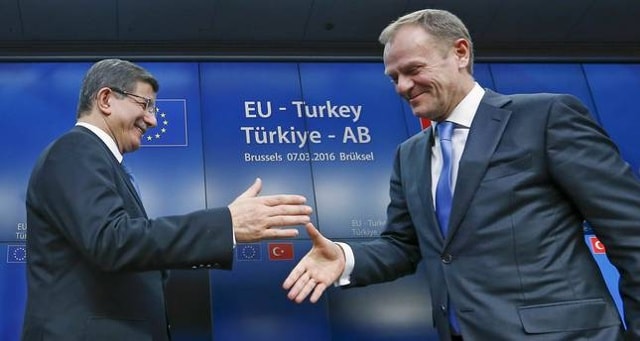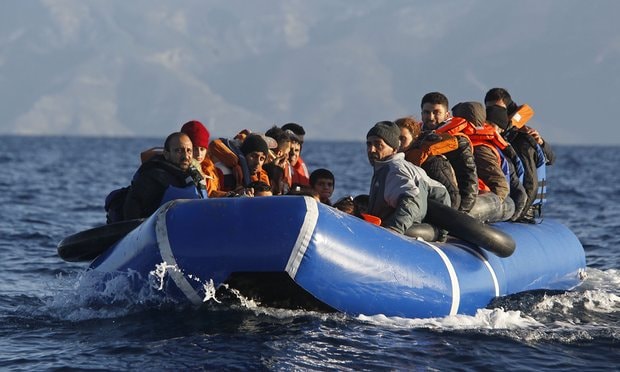Some need it, some are not in a hurry!
(Baonghean) - Despite high expectations, the EU-Türkiye Summit ultimately failed to resolve the differences and find a common acceptable solution to the migrant crisis. While the EU was in a hurry, Turkey wanted to take advantage of the crisis to exert pressure to "bargain", forcing the EU to pay a higher "price".
The EU is in a "lower position"
 |
| Turkish Prime Minister Ahmet Davutoglu (left) and European Council President Donald Tusk after the EU-Türkiye Summit on March 8. Photo: Reuters. |
The unprecedented migration crisis in Europe since World War II has increasingly made the European Union chaotic, divided and unstable. European public opinion has almost become unbearable with the consequences of the refugee crisis. Many countries have called for the rapid closure of the Balkan route (Greece - Macedonia - Serbia - Hungary), a route used by most refugees to enter Europe. In such a context, Europe is forced to look to Turkey - the most effective factor that can help the EU solve the problem of the increasing number of migrants and refugees.
Therefore, putting aside the conflicts and disagreements, the leaders of 28 member states of the European Union (EU) and Türkiye met in Brussels (Belgium) in an emergency conference to discuss solutions to the migrant crisis. But in the end, the conference could not meet the expectations of the EU when the bloc did not agree with the proposals put forward by Türkiye.
More realistically, the recent summit was a “bargain”. And this bargain clearly puts the EU in a “weaker” position. From every perspective, Europe needs Türkiye more than the other way around. Last year, more than 1 million migrants poured into Europe from conflict zones. Since the beginning of the year, of the nearly 135,000 refugees who have crossed the Mediterranean, more than 400 have died at sea. This disaster will quickly worsen as EU countries, instead of taking united and shared action, each country continues to try to “protect itself” in fear by closing its borders to refugees.
Under the agreement reached last November, the EU would provide financial support to Türkiye in exchange for Ankara helping to stem the flow of migrants into Europe. However, after three months of implementation, the agreement has not yet yielded the desired results. Migrants are still pouring into EU countries. Meanwhile, Ankara has criticized the EU for being too slow in disbursing the promised support money.
Sticking to the old line, the EU this time demanded that Ankara crack down on traffickers and force all illegal migrants to leave its shores. In addition, EU leaders pressed Ankara to accept more economic migrants from Greece and reduce the flow of people across the Aegean Sea to Athens. In return, the EU would provide Türkiye with money to cover the costs of holding and sheltering migrants.
Opportunity for Turkey to "bargain"
 |
| Every day, 1,000 - 2,000 migrants arrive in Greece after "transiting" in Türkiye and crossing the Aegean Sea. Photo: AP. |
While Europe is in a “hot water” situation, Türkiye seems to be in no hurry. Firstly, Ankara can “buy time” to bargain more with the EU in the story of migrants. If at the EU-Turkey Conference in November 2015, Türkiye offered 3 billion euros from the EU to “stop” migrants, then at this conference Ankara asked the EU to double the financial support to receive refugees. In addition, Prime Minister Davutoglu also requested to speed up visa exemption for Turkish citizens and the process of negotiating Turkey’s accession to the EU. Turkey knows very well that, although it is in great need and is in a “lower position”, the EU cannot accept this proposal, because 6 billion euros is not a small amount of money when the bloc is internally divided and the budgets of its members are not abundant.
Second, Türkiye is not the destination of migrants, they only pass through its territory before reaching the “promised land” of Europe. Therefore, despite its involvement, Ankara can still “sit back” on the migrant crisis. There are even accusations that, while its capacity to receive migrants is limited, Ankara has kept its borders open to Syrians fleeing the war. It has tolerated refugees trying to cross the sea to Greece in search of a better life in the wealthy Nordic countries.
Third, Türkiye has always expressed its view that it is the disadvantaged party when “the EU wants to put the blame on Ankara”. Turkish officials have repeatedly said why they should bear more losses than other countries? After all, this is not without reason. While many European countries consider refugees a “burden” because they are worried about security, social, cultural instability, and terrorism, why should Turkey “take the blame” and become a wall to block the flow of migrants. They will also face similar problems.
While the EU is in a hurry and Türkiye is not, with such calculations of pros and cons, it is not surprising that the two sides find it difficult to find a common price for the “bargain”. That also means that an effective solution to the migrant crisis is still far away./.
Thanh Huyen
| RELATED NEWS |
|---|
